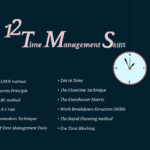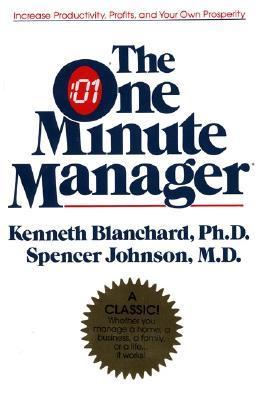The One Minute Manager by Kenneth H. Blanchard & Spencer Johnson
Genre: Management | Productivity | Self-help | Leadership
Length: 111 pages
Publish Date: First published January 1, 1981
Have you ever daydreamed about having a magical managing wand that could instantly improve your team’s performance in just sixty seconds? Just imagine a manager who uses lightning-fast strategies to crack the code to success. Wondering?
Let’s dig a little deeper. In the fast-paced world of management, time tends to be a key asset and “The One Minute Manager” sparkles as a model of efficiency and productivity where authors Spencer Johnson and Kenneth Blanchard presented a remarkably simple, yet incredibly effective, leadership approach. These approaches intend to revolutionise the way managers interact with their teams and offer a fast and effective means of achieving outstanding outcomes with three core strategies.
The key concept of this life changing book revolves around three core techniques:
1. One Minute Goal Setting:
Clearly defining goals helps to ensure that everyone is on the same page regarding expectations. This involves offering staff members short-term, tangible objectives to work towards.
Agree on your goals: Talk briefly with the staff member to establish definite, attainable goals. Comprises a quick yet targeted discussion between the manager and the worker. They talk about and establish SMART (Specific, Measurable, Achievable, Relevant and Time-bound) objectives. This results in the worker’s efforts in a clear direction and synchronises them with the goals of the company.
Write down your goals: Compile your goals on a little card or a single piece of paper. The objectives are recorded on a single sheet of paper or a little card once they have been decided upon. This material depiction acts as a concrete reminder of the tasks that must be completed. It also helps avoid misunderstandings and gives the goals more substance.
Review your goals regularly: Make any necessary adjustments and periodically review the progress. Adheres to the employee and manager on the same page regarding the objectives. Check-ins on a regular basis offer the chance to monitor development, recognise successes and make any required modifications. Additionally, it provides a platform for open debate and the chance to resolve any potential issues.
2. One Minute Praising:
When employees meet or surpass goals, this strategy pushes supervisors to give prompt & detailed feedback. It places a strong emphasis on appreciating and celebrating good behaviour.
Prompt Recognition: When an employee exhibits desired behaviours or meets goals, you should provide them immediate recognition and appreciation. The manager gives prompt feedback when an employee acts in a way that advances a particular objective or leads to the intended result. This prompt recognition motivates the worker to keep up their best efforts by reinforcing positive conduct.
Be Specific: Tell the employee just what they did well in your remark. Regarding the things the employee did well, the management ought to be precise and unambiguous. This precision aids the staff member in comprehending just which behaviour or action is being acknowledged. Additionally, it emphasises how crucial the behaviour is to getting the intended outcomes.
Express Genuine Appreciation: Express sincere gratitude for the work or accomplishment. It’s crucial for managers to express sincere gratitude for the work or accomplishment. As a result, there is a friendly and encouraging work atmosphere where staff members feel appreciated and acknowledged for their achievements.
Keep it Brief: Be specific and precise in your praise. One Minute Praise places a focus on conciseness. The idea is to provide constructive criticism in a timely and efficient manner. This preserves a happy attitude at work and keeps the attention on positive behaviour.
3. One Minute Reproaching:
Reproaching behaviour focuses on finding quick and useful solutions to performance problems. It entails talking about the behaviour rather than the individual and offering advice on what went wrong and how to fix it.
Immediate Feedback: When you notice performance problems, take quick action to resolve them. A manager takes prompt action when they witness behaviour or performance that is below expectations. This prompt input keeps problems from getting worse and enables prompt fixation.
Be Specific: Concentrate on the particular behaviour or action that has to be improved. The specific behaviour or activity that has to be improved should be the focus of the reprimand. The employee can better comprehend what has to change to satisfy expectations thanks to this detail.
Separate the Behavior from the Person: Reprimand the behaviour rather than the individual and convey your belief in their capacity to change. The manager calls out the actions rather than the individual. The employee’s self-esteem is preserved and they are shielded from feeling personally harmed by this differentiation. Furthermore, affirming an employee’s capacity for improvement encourages them to reach their full potential.
Express Concern and Confidence: Convey concerns about the employee’s poor performance while maintaining your faith in their potential to do better. The boss strikes a balance between being concerned about the inadequate work and having faith in the worker’s potential for improvement. The employee is inspired to make corrections by this kind and assured combination.
Keep it Brief: Reprimands should be brief and targeted. One Minute Reprimands are intended to be brief and targeted, much like One Minute Praising. They resolve the matter promptly and effectively, enabling both sides to proceed in a positive manner.
These core concepts and the procedures that go along with them create a strong foundation for effective management. They encourage frank communication, prompt feedback, and a fair method of identifying and improving performance. In the end, this strategy produces a productive workplace and enhanced teamwork.
Adopting the values of “The One Minute Manager,” where efficiency and effectiveness meet in sixty seconds, seems similar to wielding a secret weapon in the world of leadership. Thus, keep in mind that every minute you spend adhering to these principles will contribute to your team’s and your own success and development as you set out on this life-changing adventure. Cheers to a future filled with managerial expertise and one-minute wonders!











